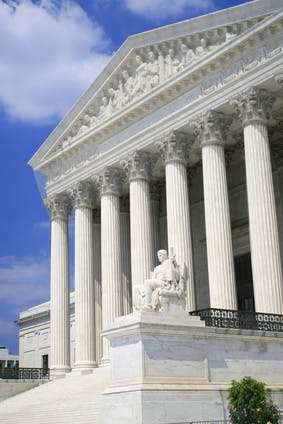By GJ Stillson MacDonnell
The U.S. Supreme Court has agreed to consider whether severance payments made to employees who are terminated are subject to Social Security and Medicare taxes (“FICA” taxes).
In United States v. Quality Stores, Inc., the U.S. Court of Appeals for the Sixth Circuit, based in Cincinnati, affirmed a district court ruling that severance payments were not wages subject to FICA taxes. The Internal Revenue Service requested review.
By way of background, Quality Stores had made severance payments to terminating employees and all payroll taxes, including FICA, were withheld from such payments. As FICA taxes are matched by the employer, both the employer and the employee paid this tax.
Severance payments and FICA refunds
After payment, the employer filed for a tax refund on the basis that the severance plan payments were supplemental unemployment benefits (SUB), and as such, were not wages for FICA purposes.
Both the district and federal appellate courts, however, found the severance to be SUB payments, reasoning that such payments were not remuneration for services under FICA but rather payments related to the “elimination of employment.” As such, these payments were not subject to FICA although otherwise subject to income taxes. The IRS argued that the Quality Stores severance payments were not exempt from FICA taxes.
In accepting Quality Stores for review, the Supreme Court will have the opportunity to reconcile a conflict within the circuits, as the U.S. Court of Appeals for the Federal Circuit in CSX Corp. v. United States, has taken the contrary position.
For a further discussion of the district and Sixth Circuit decisions, see Littler’s ASAPs, Sixth Circuit Affirms that Severance Is Not “Wages” Subject to FICA, Creating Circuit Split, and, Employers Should Be Cautious of New Decision Holding That Severance is Not “Wages” Subject to FICA.
What does this mean for employers?
Given the current split in the circuits, the Supreme Court review provides an opportunity not only to settle this issue, but also affords certain severance plan sponsors and severance recipients an opportunity to timely file for and receive refunds on FICA taxes paid.
Except for filing extensions already granted by the IRS, the earliest current open year for filing a refund claim is for tax year 2010. Pending the resolution of this case, the IRS had indicated that it would grant extensions to file suit to collect on pending refund claims.
It is estimated that if the Quality Stores decision is affirmed, it could result in multiple billions of dollars of FICA refunds. At this point, employers that have paid out severance as FICA taxable wages during 2010 or later should consider reviewing those plans and filing protective refund claims.
Pending the Supreme Court decision, employers should continue to withhold and pay FICA taxes on severance payments otherwise taxable for federal income tax purposes.
This was originally published on Littler Mendelson’s D.C. Employment Law Update blog. © 2013 Littler Mendelson. All Rights Reserved. Littler®, Employment & Labor Law Solutions Worldwide® and ASAP® are registered trademarks of Littler Mendelson, P.C.
